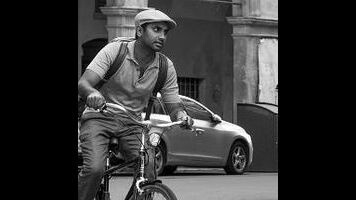Crafting a love letter to New York City certainly isn’t a groundbreaking concept in art, and yet Master Of None—with a story by Cord Jefferson and a teleplay from Aziz Ansari and Alan Yang—has written a striking love letter that soars above so much of television’s depictions of the city. Even its title reflects the episode’s devout, earnest love for the city. An inverted, verbose rewording of the sentiment seen plastered on souvenirs and clothing in gift shops throughout NYC, “New York, I Love You” is more intimate, more rhythmic, more real than that trademarked tourism campaign. Television and film often present a glitzy, blindingly white picture of New York where people of color are mere set dressing. Master Of None brings the background characters to the foreground in this episode about the interconnected lives of a group of New Yorkers, painting a richly detailed and real picture of the city.
And that doesn’t mean Master Of None is gritty or dark in its depiction of New York. On the contrary, it’s effervescent, funny, and beautifully shot. White people aren’t the only people having fun in New York, contrary to what Hollywood would have you believe. In “New York, I Love You,” Edie (a doorman), Maya (a bodega employee), and Samuel (a cab driver) all participate in the grueling grind of New York, their paths intersecting as they go about their lives. These are the characters who are seen but rarely heard in whitewashed depictions of New York. Their presence is acknowledged as an essential part of New York, and yet their experiences, perspectives, and stories remain unspoken. Master Of None, instead, puts them at the epicenter of this New York tale, makes them specific and dynamic. They have names—Eddie, Maya, and Samuel—and they have stories to tell. And with its fluid structure and very natural writing, “New York, I Love You” is equipped to tell them masterfully. One story waltzes into the next, unearthing humor from the characters’ everyday lives.
And then the white characters who usually get their stories told on screen—the businessman cheating on his wife, the woman sleeping with the married businessman, the young and wealthy women who hop into cabs without any acknowledgement that the person driving them exists—fall into the background. These people suck, and Master Of None knows it. They’re a part of New York, but they aren’t what makes this city intoxicating. “New York, I Love You” turns them into plot devices and punchlines in the way people of color usually are treated in whiter cinematic depictions of New York. Even the fact that Dev isn’t really a part of this episode—except at the beginning and the end—acknowledges the character’s privilege. Master Of None is his story, but “New York, I Love You” is not. It’s Eddie, Maya, and Samuel’s story. And Master Of None doesn’t need Dev to tell a compelling story. The episode’s bold structure, emphasis on everyday humor, and bittersweet tone make for excellent storytelling.
In Eddie’s, we see how the ugliness of the rich, white people living in his building who assume he exists simply to make their lives easier. The comeuppance of watching Eddie tell the businessman that he cannot help him when his wife catches him cheating is oh so satisfying. When the camera shifts from the women in the back of the cab to Samuel, Master Of None casually flips the script, giving voice to a cab driver (who is also much more than his job). The fact that the women spoil the end of a movie for Samuel is a funny setup that touches on larger ideas about cab drivers being ignored by entitled passengers. And once his roommates Watson, Junior, and Jameson are introduced to the story, I want an entire show revolving around this crew of heartfelt, hilarious cab drivers.
In “New York, I Love You,” we see the city through Edie, Maya, and Samuel’s eyes. And that’s especially true for Maya, who’s also deaf. The second act of the episode revolves around her and for its entirety; there’s no sound, no score, positioning us firmly in her point of view. It’s a brilliant storytelling choice, and Treshelle Edmond gives a vivacious, hilarious performance. No audio necessary: Her mere presence carries the segment, and strong editing and direction choices make the episode a technical sensation. The way her relationship drama plays out is organic and real, and her performance gives emotional weight to it.
Master Of None captures New York in unconventional ways, not in sweeping shots of its popular sights or romanticized renderings of the city’s hustle and bustle. The impromptu late-night party in a closed fast food spot with strangers and faux bottle service (a flask in a cup of ice) is one of the most New York things I’ve ever seen on TV. Even the fact that all of the characters end up at the same screening of the hot new horror film Death Castle is reflective of this city’s specific love affair with cinema. The whole episode looks and feels strikingly real, an authentic love letter that doesn’t whitewash or slap a filter on New York.
Stray observations
- Ronald Seinfeld.
- Shoutout to the Venga Bus. That might be my favorite runner of the episode.
- The entire break room scene in Eddie’s portion is fantastic.
- Who else thought Frank and Diana were going to be dogs and then scream-laughed when they turned out to be birds?

